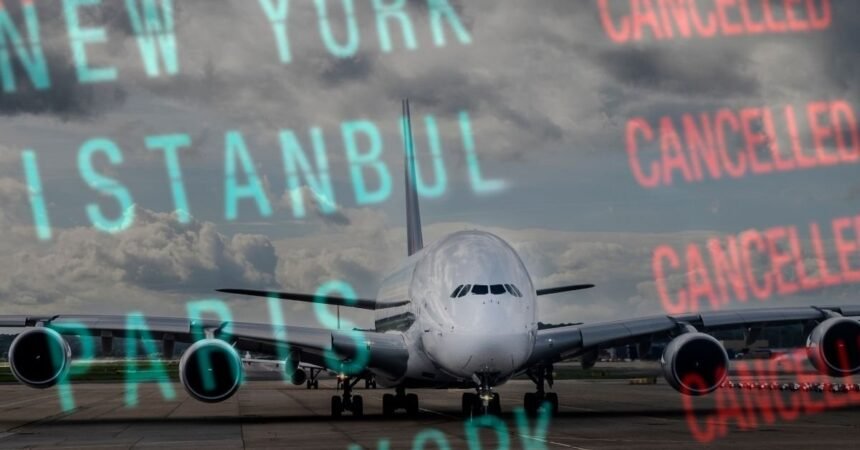Karachi Airport has witnessed a significant disruption in air travel as several flights were canceled due to technical and operational challenges. Reports indicate that this situation has affected numerous passengers, leading to frustration and confusion among travelers attempting to navigate the changes in their flight plans.
- Details of Canceled Flights
- Passenger Reactions and Challenges
- Stranded Travelers
- Understanding the Causes of Cancellations
- Technical Issues
- Operational Challenges
- Airlines’ Response to the Situation
- Customer Communication
- Operational Improvements
- Legal Rights of Passengers
- Right to Refunds
- Compensation for Delays and Cancellations
- Support Services
- The Future of Air Travel in Pakistan
- Investment in Infrastructure
- Strengthening Regulatory Frameworks
- Promoting Transparency
- International Comparisons
- Best Practices from Global Airlines
Details of Canceled Flights
The disruptions primarily involved domestic flights, with notable cancellations reported for several airlines operating from Karachi. The flight schedule released by local news outlets revealed that:
– Airblue Flight PA-807 from Karachi to Multan was canceled.
– SereneAir Flights ER-524 and ER-522 from Karachi to Lahore were suspended.
– SereneAir Flight ER-504 from Karachi to Islamabad was also called off.
– AirSial Flights PF-145 and PF-143 from Karachi to Lahore faced cancellations.
– AirSial Flight PF-125 from Karachi to Islamabad was canceled.
– Pakistan International Airlines (PIA) Flight PK-368 from Karachi to Islamabad was likewise called off.
These cancellations have raised significant concerns about the operational reliability of the airlines involved and the ability of the airport to manage disruptions effectively.
Passenger Reactions and Challenges
The impact of these cancellations on travelers has been considerable. Passengers who had planned their travel around these flights now face uncertainty regarding their schedules. Many have expressed frustration over the lack of timely communication from airlines regarding flight status changes. This situation has forced travelers to either seek alternative flights or change their travel plans entirely.
Stranded Travelers
Some passengers reported being stranded at the airport for hours, waiting for information about their flights. The absence of clear announcements or assistance from airline staff has contributed to the chaos. Travelers have voiced concerns over not only the inconvenience but also the financial implications of these cancellations, as some had made non-refundable bookings.
Understanding the Causes of Cancellations
The recent flight cancellations at Karachi Airport reflect broader issues within the aviation sector, particularly in Pakistan. Understanding the reasons behind these disruptions is crucial for both passengers and industry stakeholders.
Technical Issues
Technical malfunctions can significantly disrupt flight schedules. Routine maintenance is essential for ensuring aircraft safety and reliability, but unforeseen technical issues can lead to sudden cancellations. Airlines must prioritize maintenance schedules to mitigate such risks, as the repercussions of technical failures can cascade through the operational system.
Operational Challenges
Operational inefficiencies are another contributing factor to flight cancellations. This can stem from various issues, including:
Staffing Shortages: The aviation sector has struggled with staffing shortages, particularly in the wake of the COVID-19 pandemic. A lack of trained personnel can hinder operational efficiency and lead to flight delays and cancellations.
Logistical Issues: Problems related to ground operations, such as baggage handling and fuel supply, can also impact flight schedules. Airlines must ensure that all logistical elements are in place to facilitate smooth operations.
Weather Conditions: Adverse weather can affect flight schedules significantly. Karachi, while known for its generally favorable climate, can experience sudden weather changes that necessitate cancellations for safety reasons.
Airlines’ Response to the Situation
In light of the recent flight cancellations, airlines operating from Karachi Airport face increasing pressure to improve their operational protocols and communication strategies. The need for a structured response is critical to regain the trust of passengers.
Customer Communication
Effective communication is key to managing passenger expectations during disruptions. Airlines must enhance their communication strategies to ensure that travelers are promptly informed of any changes to their flight schedules. Timely notifications via text messages, emails, or announcements at the airport can help alleviate passenger concerns.
Operational Improvements
Airlines are likely to conduct internal reviews to identify the root causes of the recent disruptions. Implementing more robust operational strategies, including better staffing and maintenance practices, will be essential for minimizing future cancellations.
Legal Rights of Passengers
Passengers affected by flight cancellations have certain rights under various aviation regulations. Understanding these rights can empower travelers to seek compensation and ensure they are treated fairly.
Right to Refunds
When flights are canceled, passengers are typically entitled to refunds for their tickets. Airlines must provide clear procedures for obtaining refunds and should expedite the process to minimize inconvenience for affected travelers.
Compensation for Delays and Cancellations
Depending on local regulations, passengers may be eligible for compensation for additional expenses incurred due to cancellations. This could include reimbursement for meals, accommodations, and transportation costs that arise from the disruption.
Support Services
In situations of significant delays or cancellations, airlines are often required to provide support services such as accommodation and meal vouchers. Passengers should inquire about these services when faced with unexpected cancellations.
The Future of Air Travel in Pakistan
The recent cancellations at Karachi Airport raise questions about the overall state of air travel in Pakistan. As the country continues to recover from the impacts of the COVID-19 pandemic, airlines must focus on restoring passenger confidence and enhancing operational reliability.
Investment in Infrastructure
Improving airport infrastructure is crucial for accommodating the growing number of travelers. Investments in modernizing facilities, expanding runways, and enhancing security measures can lead to more efficient operations.
Strengthening Regulatory Frameworks
Regulatory authorities play a vital role in overseeing the aviation sector. Strengthening regulations related to flight operations, customer service, and safety standards can help ensure that airlines maintain high levels of reliability and service.
Promoting Transparency
Encouraging transparency within the aviation industry can also improve trust between airlines and passengers. Clear communication regarding flight schedules, cancellation policies, and passenger rights will foster a more positive travel experience.
International Comparisons
Comparing the operational practices of airlines in Pakistan to those in other countries can provide valuable insights. Many airlines worldwide have implemented robust systems for managing cancellations and disruptions, including advanced technology for real-time updates and customer support.
Best Practices from Global Airlines
Global airlines that excel in customer service often invest in technology that allows passengers to track their flights easily and receive timely notifications. These systems can reduce the stress associated with cancellations and improve overall customer satisfaction.
The recent flight cancellations at Karachi Airport highlight the need for improvements in operational efficiency and communication within the aviation sector. As passengers face the consequences of these disruptions, it is essential for airlines to address the underlying issues and enhance their services to regain traveler trust. Continued investment in infrastructure, regulatory frameworks, and technology will be key to ensuring a more reliable air travel experience in Pakistan.
#KarachiAirport #FlightCancellations #AirlineNews #TravelDisruptions #PakistanAviation #PassengerRights #AviationChallenges #CustomerService







